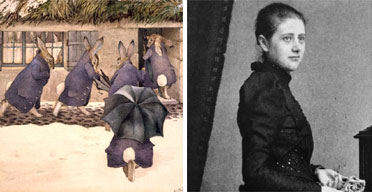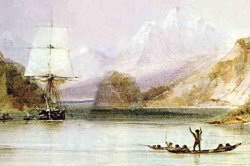Great Naturalists
Studying great naturalists will help students see the rest of Nature through the eyes of people, past and present, with a passion for the natural world. You'll find a "webquest" below to guide their research into the lives of great naturalists.

Close attention to Nature reveals constant change. Nature's progressions are gradual, continuous, and interconnected. The close examination of Nature, even unassuming landscapes close at hand, yields rich rewards on a daily basis.
— Nona Bell Estrin and Charles W. Johnson
Great Naturalists to Study
- Steve Irwin
- Frances Hamerstrom (had to sneak out of the family mansion at night to visit the marsh frogs, then became a famous ecologist)
- Arthur Adams
- John Burroughs
- Pliny the Elder
- David Attenborough
- Rachel Carson
- Lewis & Clark (Meriwether Lewis and William Clark)
- Andy Goldsworthy
- Dioscorides
- Henry Adams
- Michael Pollan
- Sylvia Earle (pioneering marine biologist and staunch defender of the sea and its creatures)
- Grey Owl and Gertrude Bernard (Anahareo)
- Fairies (think about it!)
- Carl Linneaus
- Aristotle
- Gilbert White
- John James Audubon
- Charles Darwin
- Louis Agassiz (the "father of glaciology")
- Roger Tory Peterson

- Beatrix Potter
- George Perkins Marsh
- Maria Sibylla Merian
- Fred Bodsworth, author of Last of the Curlews
- John Muir
- Opal Whiteley
- Joseph Banks
- Ann Morgan
- Al-Dinawari and other early Arabic botanists
- Stephen Jay Gould
- Anna Botsford Comstock
- Terry Nutkins
- Margaret Morse Nice
- Richard St. Barbe Baker
- Stan Rowe
- Edith Holding
- Sigurd Olson
- Chinese naturalists of the 1400s
- Henry David Thoreau
- Phoebe Snetsinger
- Georges Buffon (Georges-Louis Leclerc, Comte de Buffon)
- Romantic poets
- Theodore Roosevelt
- Eugenie Clark (world-renowned ichthyologist, or shark scientist)
- Carl Linnaeus
- Farley Mowat
- Leanne Allison and Karsten Heuer (migrated for 5 months and 1,500 kilometres across the Yukon and Alaska with the endangered Porcupine Caribou Herd — Being Caribou)
- Georges Cuvier (known as the most famous naturalist in Europe; established the concept of extinction)
- Ernest Thompson Seton
- Hildegard of Bingen
- Mary Anning (had an amazing self-taught talent for finding fossils, lived to see the coining of the word "dinosaur" in 1841, and was called the "Princess of Palaeontology")
- Antony van Leeuwenhoek (made his own microscopes and discovered bacteria)
- Merv Wilkinson
- Diane Ackerman
- Young Naturalists and other such clubs for children
- Briony Penn
- Robert Bateman
- Bill Oddie
- David Suzuki
- Joy Adamson
- John Banister
- Aldo Leopold
- Barry Lopez
- Kathleen Dudzinski
- Joseph Wood Krutch
- Biruté Galdikas (world authority on orangutans)
- Dian Fossey
- Jane Goodall
Great Naturalists Webquest
By definition, a webquest is built around resources that the teacher has already selected, allowing students to spend their time using information rather than looking for it. So, with apologies for perhaps not using the correct term, here is the outline for a research project on great naturalists.
Have each student choose someone from the list of great naturalists above, or one from your own region or country. Choose from the questions below (you might have to reword some of them for younger students) to create an age/grade-appropriate webquest that will help guide your students' research.
- Naturalist's full name
- Birthdate
- Where was he or she born? Was it in an urban town or city, or in a rural countryside?
- Date of death (if applicable)
- Current age (or age at death)
- Where did this person spend most of his or her adult life?
- What childhood experience(s) inspired this person to find a career in Nature study? Who was this person's mentor or role model?
- What is/was this person's special focus? (List all that apply to Nature.)
- Was this person self-taught, educated at school/university, or both?

- Where did this person learn about the natural world? (For example, on a family farm? At university? On a sailing ship?)
- In what environment(s) did this person do most of his or her study of Nature? (For example, in or near the mountains? Near the
ocean? In their backyard?)
- Give an example of this person's main accomplishments in life. (In other words, describe at least one thing that this naturalist became famous for.)
- Give an example of what others say about this person's importance or influence in the world.
- What evidence still exists of this person's accomplishments and influence/importance? (Books? Artwork? A theory? A newly discovered species?)
- Give one famous quote from this naturalist, or show one famous drawing or something else that he or she created.
- In your opinion, was this person happy? What is your evidence?
- Tell one thing you learned, about the natural world or about yourself, through researching this person.
- During your research, what hints did you find about this person's learning style? In what ways is he or she similar to you?

A great shift in the Western naturalist’s frame of mind over the past fifty years, it seems to me, has been the growth of this awareness: to get anywhere deep with a species, you must immerse yourself in its milieu.... A modern naturalist, then, is no longer someone who goes no further than a stamp collector, mastering nomenclature and field marks. She or he knows a local flora and fauna as pieces of an inscrutable mystery, increasingly deep, a unity of organisms Western culture has been trying to elevate itself above since at least Mesopotamian times. The modern naturalist, in fact, has now become a kind of emissary in this, working to reestablish good relations with all the biological components humanity has excluded from its moral universe.
— Barry Lopez
In a world where we seem to value celebrity more highly than contribution and accomplishment, studying the life histories of great naturalists can serve as an intriguing step in reconnecting children with what matters most in life — life itself.
Return from Great Naturalists to Transformative Nature Study
Go to GreenHeart Education Homepage



